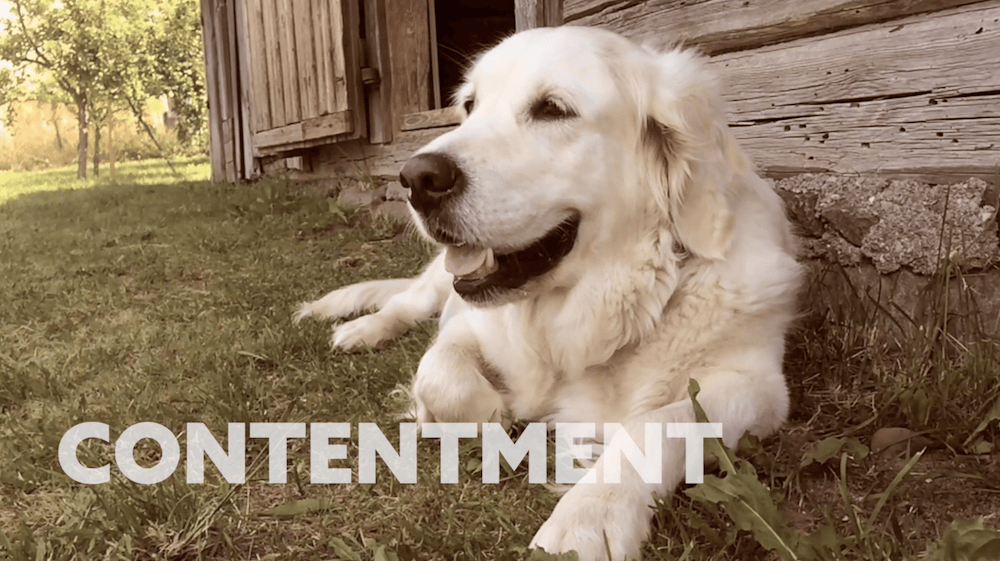
Simple Habits to Help You Live Your Best Life Every Day
We have all heard the saying “the best things in life are free”. But are they really? As I have grown, I have come to
Home » Contentment
We have been told to be content with what we have, where we live, and who we are. Is this possible? It does sound amazing. But what is contentment? Is it really possible to be content?

We may have been taught that life is a race to be run as we strive to be the best in everything we do: to be the most successful in school, in sports, in landing a high-paying job, followed by the ability to pay cash for an expensive car and a lovely home. There is nothing wrong with great achievement; however, if we ever stop enjoying what we have, be it great or small, if we stop being grateful, or even recognizing our blessings, we will miss an important and fulfilling part of life. We will miss enjoying what we have earned and the joy that comes from sharing.

Contentment is not the absence of desire for more, or of no longer striving for success. It does mean being satisfied with the present situation, thankful for the blessings, and being able to find joy in our station in life. Contentment then means serving and sharing as we go. It is avoiding becoming greedy and grasping, but it is rather that of developing a thankful and inclusive type lifestyle that blesses others as well as ourselves.
“Be happy with what you have while working for what you want.” Helen Keller said.
A contented person is gracious and kind. A contented person can see the needs of others and help others succeed. A contented person develops a life of praise and service. A contented person can enjoy life, love others, live without envy, and share love and life fully. A contented person can enjoy what he has, what he has accomplished, and who he has become. A contented person gives praise to God for entrusting these blessings to his care.
Recognizing all one has – family, health, income, friends, faith – everything – and appreciating and acknowledging those blessings – is the secret of happiness and contentment.
Proverbs 28:25 “A greedy man stirs up dissension, but he who trusts in the Lord will prosper.”
Many may ask what does the Bible say about contentment? In the Book of Philippians 4:11, we read what the Apostle Paul wrote, “I have learned to be content in whatever circumstances I am.”
When we truly believe that we are who God says we are, we find the peace that the world cannot give, nor can it take away. This is the contentment of the soul. No one can take us, as Believers, out of the Kingdom of God. We have been bought with a price. We are beloved by the Eternal God. We know Whose we are. He promises us forgiveness by his Grace, eternal life as a sure Hope, and redemption and new life through His Mercy.
All fear is gone when we place our faith in the sacrificial death and resurrection of Jesus Christ. The angst begins to disappear. When troubles and fear shake our faith, we can rest in His promises. Jesus is our Lord, our God, our Shepherd, who gave himself as a sacrifice in order to pay for our sins.
We are bought and paid for. We can rest in that promise – after all, that amazing promise is from the Creator God, the Everlasting Father, the King of Kings. He bought us at a heavy price. We no longer have to search or work for a place in heaven. We have reservations there forever if we only believe and receive this unbelievably precious and secure gift – we now belong to God.
Let’s remind ourselves of this so we can know spiritual contentment. When we live as if we believe it, we can be a source of encouragement, comfort, and worldly needs to others. We can love the unlovable, feed the hungry, and care for the sick in the name of Jesus. And we can lay our heads down at night, resting in His care, and wake to the Joy of the next day and the promise of His presence.
Abiding in His loving presence, reading His Word in the Bible, and showing our gratitude in our praise and in our service, gives rest to our weary souls and we know the contentment of belonging to the Loving Father.
When we truly believe that we are who God says we are, we find peace and contentment that the world cannot give nor take from us. We find the significance that lasts forever.
Decide that you want to define yourself as God defines you – as a child of God. Know there is nothing you can do to make God love you more than he does or less than he does. Understand that you are a child of God, free to love and serve others – even if they don’t like you. And you are free to serve in the name of Jesus. –
The world may not treat us well, may even harm us. But, if at all possible, let us learn to live peacefully with others. Be kind. Be joyous. Be Content. As a child of God, we realize contentment when our ‘I-want-a’s are overridden by our ‘I-need-a’s. A balance in life. May we all become good stewards of what God has given to us. May we learn to rest in the contentment of trusting God.
There is no single rigid answer to the question of what does contentment mean? It is within us. It is who we are. It is what we see as important. But it is of such magnitude that we must address it in our own lives. Having or not having a sense of contentment determines our peace of mind.
Contentment is not living a life of resignation. It is not being resigned to one’s status in life. Contentment means that you are in a position ready for growth and self-improvement. You are not beating yourself up and you do not feel defeated. You are the fertile ground, and ready to plan for an even better future. It means you know who you are and whose you are.
A content person is ready for new growth, ready to aspire to help others, to share one’s faith and noble dreams with others. It means liking oneself. And liking oneself is the foundation for loving others, aspiring to fully enjoy all that the world has to offer. It does not mean complacency. Or indolence. Or withdrawal.
On the contrary, it means self-realization and self-assurance, enabling us to pick up the gauntlet and live life to its fullest. When we are able to distinguish our wants from our needs, we unburden ourselves and relieve ourselves of that stress.
Contentment promotes happiness. It means recognizing the positive things in one’s life, the inner growth, the development of a caring spirit. It means acceptance of our place in life and allowing ourselves to be happy in it. And to share that happy and complete self with another.
Counting your blessings, rather than dwelling on things you do not have, can be the difference between joy and bitterness. Choose joy. Choose love. Choose gratitude. Choose happiness. Choose to be content.
Acknowledging contentment in one’s life promotes better health. Why? Because the level of stress decreases. Learning to enjoy the everyday blessings, rather than living in an attitude of constant striving for more, improves our physical and mental health as well as our relationship with our spouse and children.
Certainly, it will make one a better leader at work. Today was great. May my attitude make tomorrow even better for me and for those who surround me. May they see a spark of the Divine within me. May I see the pain of those who are hurting and those who are needy. And to the degree that I can, may I be a part of their renewal and, ultimately, their level of contentment.
Contentment may lead to the realization that material things do not produce joy. Joy comes from within; it produces wholeness. True joy gives us insight into how to practice contentment.
Learning to distinguish between wants and needs helps us to practice and begin to live in contentment. When basic needs are provided, the wise person realizes that this is enough – enough to lead a happy and healthy life. Everything else is gravy: you have what you need so everything else is a bonus. Tim McGraw sings: “If I could hug my kids and kiss my wife – One more day in this crazy life – Take a second to stop and smell the daisies. Everything else is gravy.”
Even when we know what contentment is, practicing contentment may be another story. Do we know when enough is enough? When another couple of hours at work robs us of having time with the kids before bedtime? Do we realize the value of time? Have we learned to allocate the best number of hours to the demands of our life? Are our priorities in order?
My heart goes out to those who struggle with long hours and low pay while trying to provide for family needs. Ideally, the overabundance of assets of successful people should be used to help others less fortunate obtain more education and training for a better job.
The successful person helps build an economy that provides employment for others. Each provides for his own, at different levels, while working to accomplish the opportunity for all to find contentment.
Our goal as we become financially successful should be to aid others to earn at least enough for their basic requirements and the possibility of a happy life. It’s all about community. Self-respect. Joint efforts.
Helping others to find work in order to earn adequate wages to provide for themselves is a step toward a healthy society. We are not an island – we must be a part of the solution.
I have never been offered a good-paying job by an unsuccessful or broke individual. Nor did I ever plan to work for a defunct company or one facing bankruptcy. And I enjoy the times when I am interacting with my wealthier friends who are generous and loving – who treat everyone equally.
Friendship should not depend on the size of the wallet. There are infinite external factors that have determined our position in life. Yet we all are offered the gift of eternal salvation in Christ, regardless of our station.
Being able to earn enough to provide for our own needs, to develop the character that earns respect, to be able to share the overage with the needy – these are the things that bring a sense of contentment and great meaning to our lives.
“Keep your lives free from the love of money and be content with what you have, because God has said: ”Never will I leave you, never will I forsake you.” Hebrews 13:5
In Phil 4:11-13 we find: “I am not in need, for I have learned to be content whatever the circumstances. I know what it is to be in need, and I know what it is to have plenty. I have learned the secret of being content in any and every situation, whether well fed or hungry, whether living in plenty or in want. I can do everything through him who gives me strength.”
The Apostle Paul, the writer of this letter, is encouraging a group of believers in Philippi to recognize their blessings and to live life fully. Our happiness is not based solely on what we own or where we dine regularly.
Our happiness is based on the inner peace we have when we are plugged in to the living God, knowing that our strength, our provision, and our future, are completely dependent on that relationship. Do you, do I, really know what is self-contentment? Have we experienced it?
Perhaps we do best when we consider contentment an ongoing and developing virtue. Our lives are ever-changing. Our goals change. Our situations change. Our health changes. Our responsibilities change. If we can weather the changes, handle the upheavals, roll with the punches, and still maintain our strength of character and integrity, the evolving nature of self-contentment will become a symbol of wholesome living and loving.
Have you noted a sense of discontent in your life? Does it hover like a dark cloud around you, stealing the joy of the moment, isolating you from others, stressing you to the point of constant anxiety and ultimate fatigue? Have you forgotten how to be happy and thankful? How do you get contentment in your life?
Have we been led to believe that we cannot be content unless we are in the top 5% of money earners? Perhaps you have found that you are more content and fulfilled living more modestly in a position where you are helping to build character in students.
Perhaps by teaching ethics that will help them develop into people with values and trust. How difficult is it to choose to take the lower-paying position? Is there other recourse? Life is filled with dilemmas, some that make us question our values, our commitment.
Can we say that contentment reflects maturity? Maturity alludes to a fully developed and controlled individual. And so we pray for wisdom. In his word, God promises: “If any of you lacks wisdom, you should ask God, who gives generously to all. He will not rebuke you for asking.” James 1:5. Calculating what is the better plan and finding contentment in the decision is guided by wisdom.
“Blessed is the one who finds wisdom, and the one who gets understanding, for the gain from her is better than gain from silver and her profit better than gold.”
I find circumstances no lighter, and instead, decisions that are more complex, as the world quickly evolves into this huge mass of information from which truth must be filtered and meaning deciphered. Limiting the amount of news bombardment and keeping the amount of time spent on things outside our control to a minimum, allows us to reserve time for seeking truths and making wise decisions. This purposeful exercise can remove much angst and stress in our lives.
I find comfort in the Scriptures that encourage us to ask for wisdom and it will be given to us. When we allow God to step into our lives and give us his understanding, we can find more peace and contentment in our own world.
In the world where we actually do have influence and the opportunity to feed truth received from our time with the Lord. He welcomes our request. Proverbs 3:13 says “Happy is the man/woman that finds wisdom and gets understanding.”
“When God grants us wisdom and understanding, we become more content in our decision-making because we know that he is guiding us. God is not the author of confusion, but of peace.” I Corinthians 14:33.
When we can finally learn to wrap our finite minds around the concept of true wealth vs possessing a wealth of worldly things, we are enroute to understanding what is the path to contentment. Blessed and happy is the person who has ample amounts of money and goods and has found contentment in enjoying these treasures, while developing a spirit of using the abundance to bless others.
We all know the person who flaunts her money and jewels and only seeks to earn more. Others may actually have more; live very comfortably; enjoy life, yet never be suspect of being overly wealthy. The latter are content with what they have. They live comfortably, work hard, and may donate thousands to non-profits.
Money does not control their thinking. They control their money. They attribute their success to the Lord for allowing them to be successful. Their choice of friends is not based solely on having similar portfolios. They are the first to underwrite a charity. They are comfortable and content. They are a joy with whom to associate.
When we base our value and others’ value on net worth, we show evidence that our judgments are not that of the Almighty God. Many are the super-wealthy who have no contentment in their life. In fact, their every thought is how to acquire more worldly goods. Or their concern is that someone is trying to steal their fortune from them.
How much is enough? Determine that for your own needs. Balance your time and commitments between making adequate income and living a superabundant and joyful life.
Luke 12:15 “Watch out! Be on your guard against all kinds of greed; a man’s life does not consist in the abundance of his possessions.”
Psalm 37:3 “Trust in the Lord and do good; dwell in the land and enjoy safe pasture. Delight yourself in the Lord and he will give you the desires of your heart. Commit your way to the Lord; trust in him and he will do this”
The art of being happy is to be satisfied with what you have. Remember that “Someone else is happy with less than what you have.” Recall your conversation with the last genuinely happy person you know. Were finances the main subject of your shared time? Was his self-worth based on his bank balance?
The person who realizes that they are valuable in God’s sight, the person laying up treasures in Heaven, the person who rests in knowing forgiveness in God’s sight – that person can know his worth is not in what he owns, but rather in whom he trusts, and how he uses the gifts he is given. Here are 10 tips to increase happiness and contentment.
Whether you have questions, you’d like to be prayed for, or simply wish to connect with a real person, we have people waiting to hear from you. Please click below!

We have all heard the saying “the best things in life are free”. But are they really? As I have grown, I have come to

In a land of abundance – the abundance of goods, opportunities, choices, beauty, and grandeur, why does a feeling of discontent continue to take away

Finding the answer to the challenging and unfathomable questions of how to find peace and fulfillment in life continues to be daunting for each generation. We

Biblical wisdom in a chaotic world In my own life, I’ve always tried (but fought) the need to either know or experience something before any
